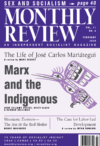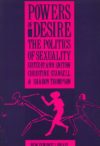Commentary

As an exposition of capitalism’s contradictions, Paul Baran and Paul Sweezy’s Monopoly Capital remains one of the most influential treatises in Marxist political economy produced in North America. Among Baran and Sweezy’s sociological investigations, they identified the negative consequences of capitalism for mental health, drawing attention to the manner in which the organization of capitalist society conflicted with the essential needs of the individual. | more…

When Paul Baran and Paul Sweezy’s Monopoly Capital was published by Monthly Review Press in 1966, two of the chapters originally drafted for the book were left out of the final volume: what was to have been Chapter 9 in the original plan for the book, entitled “Some Theoretical Implications,” and what was intended as Chapter 11, “The Quality of Monopoly Capitalist Society: Culture and Mental Health.” In July–August 2012, “Some Theoretical Implications” was finally published in Monthly Review. This was followed by the publication of the first part, approximately two-thirds of the whole, of “The Quality of Monopoly Capitalist Society: Culture and Mental Health,” titled “The Quality of Monopoly Capitalist Society: Culture and Communications,” in the July–August 2013 issue of the magazine. The section on mental health was left out on the grounds that it was incomplete. We finally publish it here. | more…

Seattle in 1919 was an island in a still immeasurable sea of timber. The Pacific coastal forests were estimated to contain nearly two-thirds of the timber in the country, and the Washington State forests accounted for the largest part of these. The physical hardships associated with the lumber industry, including isolation deep within the rain forests, made working conditions an even more miserable burden than low wages. The work was seasonal and layoffs were common; the completion of one job might mean termination and the search for work elsewhere. When the winter rains brought an end to work in the woods, the state’s loggers fled to the city, not welcome elsewhere. In some years, there might be thousands on Seattle’s streets. | more…

Healing through the stories we rescue and the history we make is what Aurora Levins Morales’s Medicine Stories: Essays for Radicals is about. The author, a historian curandera, compiled a series of twenty-eight essays in this second edition, published twenty years after the first. Levins Morales theorizes movements for social justice and how to overcome challenges faced by activists and all those fighting and resisting oppression. She does this through accounts of her studies, personal experiences, and social conditions, providing a view of the world that allows collective healing and encourages it in others through a comprehensive understanding of history. | more…

A new poem by Kenneth Salzmann, author of The Last Jazz and Other Poems. | more…

According to the U.S. Bureau of Labor Statistics, the U.S. economy is experiencing an unemployment rate that is at a fifty-year low. Yet, wage growth continues to be weak, with continuing wage stagnation even at the peak of the business cycle. A major and largely undertheorized reason for the sluggish wages in a period of seeming full employment is to be found in the fact that the new jobs being created by the economy do not measure up to those of the past in terms of weekly wages and hours, or in the degree to which they support households or even individuals. | more…

The “turn toward the indigenous” in social theory in the last couple of decades, associated with the critique of white settler colonialism, has reintroduced themes long present in Marxian theory, but in ways that are often surprisingly divorced from Karl Marx’s critique of capitalism, colonialism, and imperialism. | more…

The Ass and the Red Heifer
The relation between Zionism and Judaism (the Jewish religion) is paradoxical and complex. In its early days, Zionism was apparently a thoroughly secular political movement. In reality, while its ego was secular, its id has always been religious. And in recent times, the latter has emerged from its hidden recess and is parading in full view. | more…

While later generations of Marxian scientific socialists saw sex as secondary, derivative of the real relationships of production, many of the earliest socialist theorists and movements took sexual matters very seriously. Thus, in many ways, the advent of Marxian socialism represented something of a step backward in the development of a radical sexual politics. However, in the twentieth century, old divisions on the sex question within the left soon reappeared. | more…

As Benjamin Selwyn points out in his sharp and thoughtful The Struggle for Development, capital-centered development deepens exploitation. Selwyn powerfully challenges the capitalist road to further immiseration for the majority of the world’s population, opening up an important discussion regarding what is to be done in the twenty-first century. An alternative form of development, led by the laboring classes, is not only necessary but possible. Above all, “labouring-class movements and struggles against capitalist exploitation can be, and are, developmental in and of themselves.” | more…

Mike Gonzalez’s new biography of JosŽ Carlos Mari‡tegui is an important attempt to introduce the Peruvian socialist to an English-speaking audience. It constitutes not so much a rediscovery of Mari‡tegui, but is itself part of a slow but steady embrace of a novel and innovative thinker broadly credited with the creation of a Latin American Marxism. | more…

Margaret Benston's Marxism and a Social-Reproduction Approach to Gender Oppression
There is an unresolved tension at the heart of Marxist explanations for women’s oppression under capitalism. Although there is general agreement that the bourgeois family, as the dominant kinship unit, has something to do with generating and reproducing that oppression, the exact role of the family varies among Marxists. In this respect, Margaret Benston’s proposal to situate domestic labor within capitalist production was truly pioneering. Rather than record and describe domestic work, Benston theorized this labor and laid the basis for later feminists to apprehend the production of commodities and the reproduction of labor power within a unitary framework. | more…

Vesa Oittinen interviews Andrey Maidansky about Soviet philosophy and the well-known and controversial Soviet philosopher Evald Ilyenkov (1924–79). | more…












